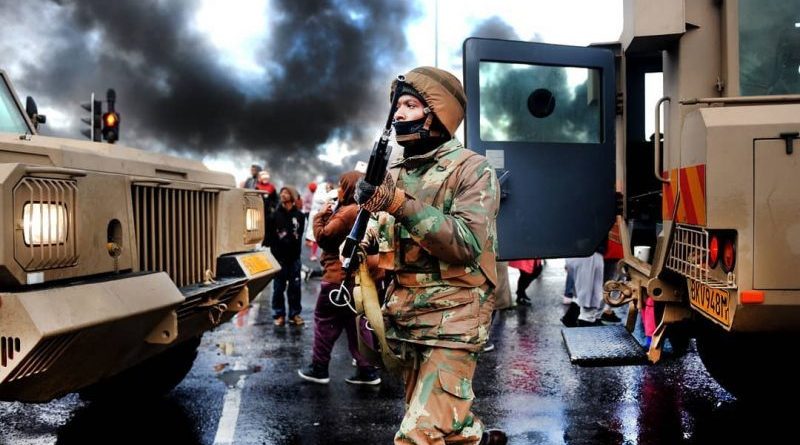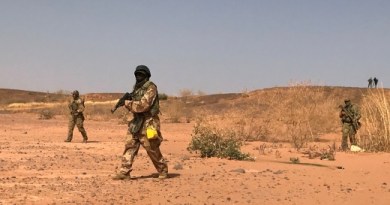Islamic terrorism: South Africa at risk
As the Islamic State (IS) is being pummeled in the Middle East by coalition forces and also in West Africa by the Multinational Joint Task Force (MNJTF), the terror group has been looking to broaden its reach.
It is only a matter of time before Southern Africa oil and gas companies are targeted, for the particular reason that, Islamic State leader Abu Bakr al-Baghdadi has called for “the fight to go on” and broadened beyond its current geographic scope.
“There is absolutely a link between ISIS’s territorial defeat in Iraq and Syria and the rising threats in Mozambique and elsewhere,” said Colin Clarke, a senior research fellow at the Soufan Center in New York.
At the moment, Southern Africa is experiencing a sharp rise in insecurity and there’s a surge in local conflicts which is threatening social cohesion. Crimes such as arms and drug trafficking, illegal mining and poaching are increasing.
While Murder rates in South Africa have been steadily rising since 2011-12 according to official figures, more alarming also is that a total of 2.01 million crimes were recorded in 2019 – down from the 2.09 million recorded in 2018.
This is worrying because research shows that terror groups especially in Africa are birthed and sustained by a multiplicity of localised state vulnerabilities linked to political, social, economic and security governance problems. Similar to what is currently being experienced in South Africa.
Currently, the terror threat is expanding beyond the eastern and western part of the continent, Although, as of now, the closest, and biggest, terror threat comes from SA’s eastern neighbour, Mozambique in the far northeast province of Cabo Delgado.
There has been an increasing intensity of attacks in Cabo Delgado since January 2019, with attacks reported in the districts of Palma, Mocimboa da Praia, Macomia, Nangade, Quissanga, Muidumbe, Meluco and Ibo.
In Mozambique, jihadists used explosives, machetes and firearms to carry out lethal attacks, to date, there have been over 20 attacks in the first five months of 2019. In January 2019, in an amphibious operation, militants attacked the village of Mussemuco, Ibo District.
On 28 May 2019, 16 people were killed when militants attacked a vehicle in Macomia, using explosives and firearms. This was the deadliest incident to date. In June 2019, Islamic State claimed responsibility for the attacks.
According to the United Kingdom’s Travel Advisory to Mozambique, there are reports of an increased security presence in the region, including road blocks, and there are regular clashes between insurgents, armed vigilante groups and Mozambican security forces.
When it comes to Mozambique and South Africa, migration monitoring, control and management is failing, according to Jasmine Opperman -an international terrorism expert. Jasmine also noted that the porous Mozambique and South African border could serve as conduit point for arms transit.
Mass movement of people across borders, remains a major security challenge for policymakers in Africa.
The Islamic group in Mozambique has its roots in Kenya as a religious sect, al-Sunna followers moved to Cabo Delgo after its leader Kenyan cleric Aboud Rogo Mohammed was killed by Kenyan security forces for allegedly supporting Somalia’s al-Shabaab.
The way forward
Preventing and countering terror activities effectively requires a paradigm shift, especially in designing a coordinated military and civil approach.
In formulating an effective counter-terror strategy, Southern Africa leaders must place emphasis on three critical factors.
First, to avoid growing the ranks of violent extremists, security actors should ensure that interventions must respect human rights, since existing evidence indicates that social malcontent, security forces highhandedness, poverty and corruption are the root cause terrorism in Africa.
Secondly, African leaders should ensure that such security responses are just one part of a larger strategy that includes prevention, development and socio-economic interventions in the short, medium and long terms.
A determined effort to eliminate corruption, poverty, disease, obstacles to democracy, huge disparities of income, environmental degradation, social injustice, barriers to the press effective family planning would go a long way in mitigating future terror potentials.
Finally, adoption of modern technologies by military forces would provide the necessary edge in countering terrorism. Recently, both Boko Haram and al-Shabaab had made use of internet or social media in achieving their objectives.
The internet is useful for reaching out to young people, particularly during recruitment exercises. Also, it has found use as a communication and coordination tool during attacks, as well as being used to raise operational finances.
Generally, technology has significantly accelerated and changed the way wars have been fought.
Therefore, proper adaptation and use of modern innovative technologies can help turn the tides of war.


